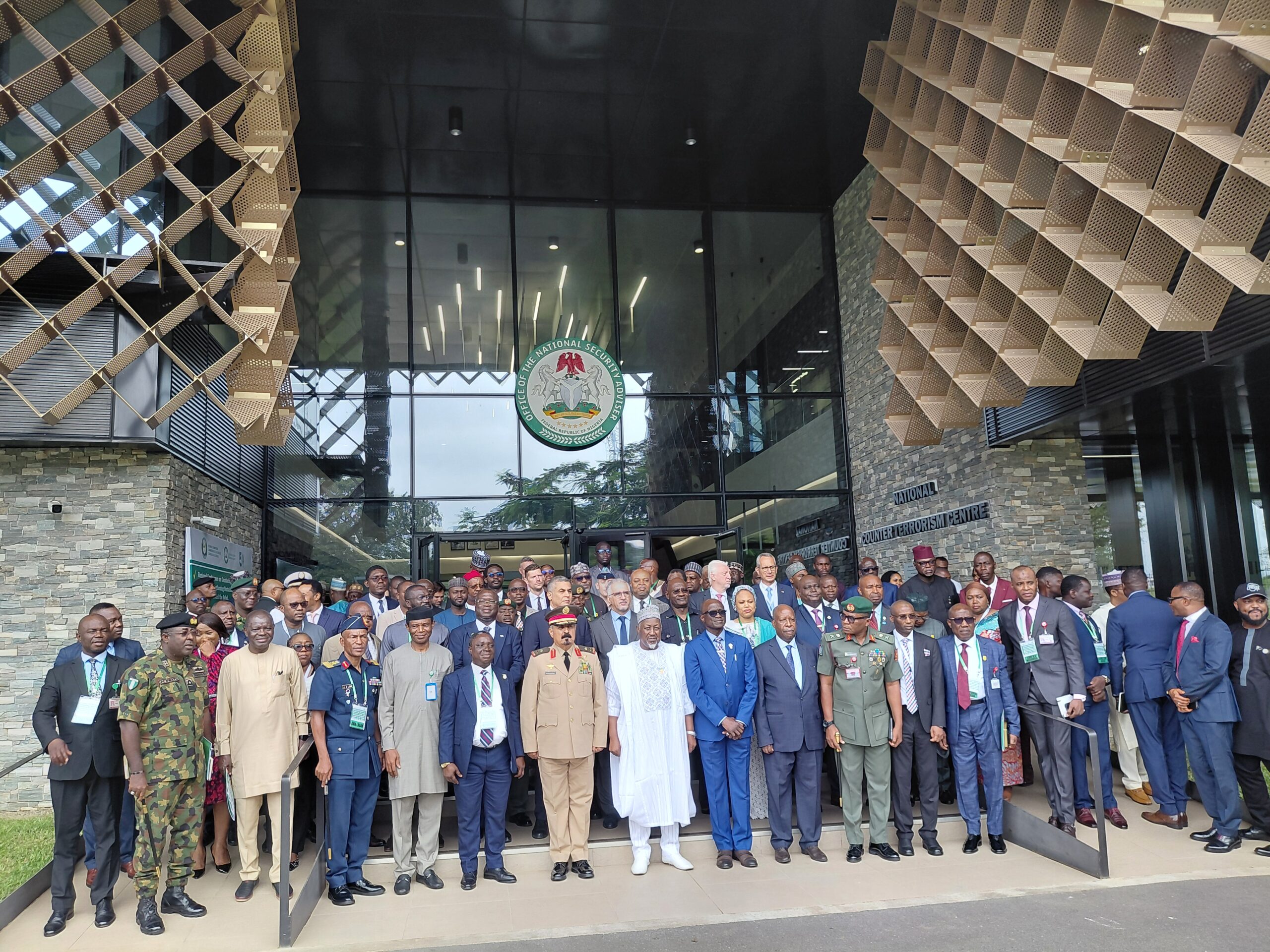By Bavoriat Clara
The National Counterterrorism Centre (NCTC), in collaboration with the ECOWAS Commission, has convened a high-level Regional Conference on Combating Emerging Terrorist Groups and Strengthening Sustainable Security in West Africa and the Sahel, where leaders and security experts called for urgent and coordinated regional action against terrorism, insurgency, and violent extremism.
The two-day meeting, which opened in Abuja, drew participation from ministers of defence, chiefs of defence staff, ECOWAS representatives, United Nations officials, security experts, and development partners.
Nigeria’s Minister of Defence Mohammed Badaru Abubakar who was the Special Guest of Honour declaring the conference open, emphasized that terrorism is no longer confined to isolated theatres of conflict but has become one of the greatest threats to peace and stability in West Africa and the Sahel.
He stressed that while the use of force is unavoidable, it cannot on its own deliver lasting peace.“Military force is necessary but not sufficient,” he said. “Poverty, unemployment, exclusion and poor governance provide fertile ground for extremist ideologies. Investing in education, strengthening community resilience, and ensuring good governance are equally critical to our long-term security.”
He added that extremist groups have become increasingly adaptive, highly networked, and technologically sophisticated, deploying drones, encrypted communication platforms, and exploiting ungoverned spaces.
“These realities are stark, but they do not define our destiny,” the Minister said. “We must confront them collectively with determination, innovation, and solidarity. National responses, though commendable, are not enough against a transnational menace.”
The Minister outlined three strategic priorities for regional action:Intelligence integration: Establishing real-time platforms for information sharing on terrorist financing, movement, and recruitment. Joint operations: Institutionalizing multinational counterterrorism forces with clear command structures, harmonized legal frameworks, and enhanced capacity building. Addressing root causes: Tackling socio-economic drivers of radicalization such as poverty, inequality, and exclusion.
He further praised President Bola Ahmed Tinubu’s Renewed Hope Agenda, which has put security at the heart of Nigeria’s national development strategy, highlighting recent successes in dismantling terrorist strongholds, rehabilitating insurgents, and strengthening multinational efforts such as the Multinational Joint Task Force (MNJTF).UN Envoy: “West Africa accounts for most terrorism fatalities worldwide”
Delivering the keynote address, the Special Representative of the United Nations Secretary-General for West Africa and the Sahel, Leonardo Santos Simão, described the security situation as alarming. Citing the 2025 Global Terrorism Index, he revealed that West Africa and the Sahel accounted for the highest fatalities from terrorism in 2024, with five of the world’s ten most affected countries located in the region.
He warned that extremist groups are not only increasing in number but also in sophistication, exploiting local grievances, climate pressures, and political instability.
“The human cost is staggering over 1,300 children were recruited by armed groups in 2024, 466 cases of sexual violence were recorded, and more than 14,000 schools were closed due to insecurity,” Simão said.
Simão commended ECOWAS and the African Union for initiatives such as the establishment of a Threat Fusion and Analysis Cell and urged stronger collaboration in intelligence sharing, governance reforms, and investment in social services, particularly targeting youth and women
Also speaking on behalf of the Chief of Defence Staff, General Christopher Gwabin Musa, the Chief of Defence Operations, Major General Emeka Onumajuru, reaffirmed Nigeria’s commitment to both national and regional counterterrorism operations.
He stated that the Armed Forces of Nigeria have been at the forefront of confronting terrorism, banditry, and violent extremism through joint operations across the North East, North West, and North Central regions, while contributing to multinational frameworks such as the MNJTF and ECOWAS initiatives.
General Musa, stressed the importance of African-led solutions, solidarity among member states, and the need to complement military campaigns with civil-military cooperation, peacebuilding, and humanitarian support.
In thesame vein, representing the ECOWAS Commissioner for Political Affairs, Peace and Security, Ambassador Abdel-Fatau Musah, Dr. Sira commended Nigeria for offering its NCTC as a regional hub.
He stressed that terrorism remains a shared threat that cannot be addressed in isolation and urged member states to leverage the platform provided by Nigeria to strengthen cross-border cooperation.
He further noted that despite political tensions within the bloc, ECOWAS remains committed to keeping security collaboration open, even with states that have withdrawn, in order to safeguard regional stability.
The Abuja conference, which coincides with the 50th anniversary of ECOWAS, aims to produce a roadmap of actionable strategies to operationalize the ECOWAS Counterterrorism Force, strengthen intelligence coordination, and incorporate civil society, youth, and media into regional security frameworks.
Over the next two days, expert panels are expected to deliberate on intelligence-sharing mechanisms, regional funding for security operations, counter-radicalization strategies, and community resilience.
Welcoming participants, the National Coordinator of the NCTC, Major General Adamu Laka, described the gathering as timely and necessary in light of the expanding footprint of terrorist groups such as Boko Haram, ISWAP, JNIM, and Al-Qaeda affiliates.He recalled that Nigeria’s National Counterterrorism Centre, established under the Office of the National Security Adviser, was recently upgraded into a Regional Centre of Excellence following the Abuja Declaration of April 2024.
According to him, the Centre now serves as a hub for coordinating counter-terrorism strategies, hosting state-of-the-art forensic laboratories, and providing capacity-building programmes for regional agencies.
“Our experience has shown that sustainable solutions to terrorism must go beyond battlefield victories. They require community engagement, deradicalization programmes, socio-economic empowerment, and strong regional intelligence sharing,” he said.
Over the next two days, expert panels are expected to deliberate on intelligence-sharing mechanisms, regional funding for security operations, counter-radicalization strategies, and community resilience.
The outcomes are expected to guide ECOWAS member states and partners in building a resilient, inclusive, and sustainable regional security architecture.
